We’re getting lost in all types of space this week. Don’t drift off now, ya hear?
LISTEN
Some ambient albums to fill up your space
Merriam-Webster defines the word ambient (what is this, a grade 7 speech assignment?) as “existing or present on all sides.” It makes sense to me then, that ambient music, at least in my limited experience, is often the kind of music that feels like it fills up the space around me in the most unobtrusive of ways, like air in a room in which I sit or water in a pool in which I swim. Here are a few of my ambient go-tos:
Geotic - Mend & Morning Shore (Eon Isle)
I lump these two albums together because they’re both very much in the same vein. Mend was probably my first real dive into instrumental music that didn’t have a beat and wasn’t classical. It’s a timeless (and I mean that in more than one sense of the word), hypnotic, and peaceful album of gorgeous, layered guitar riffs. Morning Shore builds upon this vibe with some more beachy bright tones sprinkled in.
Asher Graieg-Morrison - Things Are Being Held Together
I supposed I might be biased because Asher’s a friend of mine from grad school, but I’m continually marvelled by his creative output—and I use that last word very intentionally; much of the music he makes is a wonderous blend of inputs and outputs, tape machines and guitars and pedals and who knows what else (I’m sure he does; I don’t). It’s a lot, but it’s all being held together in subtly mesmerizing and patient fashion.
Two Bicycles - The Ocean
From the short-lived ambient side project of Ponytail Press friend Teen Daze comes this beautiful Bandcamp-only album of unique guitar and piano instrumentals. Some tracks incorporate some electronic drums and more noticeable rhythms into the mix, but for the most part, the album sticks with tides of simple melodies, slowly building up and down with moods that vary from calm and awe-inspired to tense and anxious. As the album description says: “The ocean can bring both optimism and fear, hope and loneliness.”
Geotic - Realms & Neptune
Speaking of oceans, they’re probably the best metaphor to use to describe these two releases, also by the aforementioned Geotic: they’re expansive (Neptune’s two tracks are both over 23 minutes) and seemingly monolithic but always moving, ever so subtly, rising and falling, pulling and pushing. I’m not a person who uses music or any other form of audio to fall asleep, but if I was, these would probably be the tracks I’d put on.
-JB
WATCH
Four Favourites: Space Movies
Alien (1979)
The vastness of space means nothing in this claustrophobic horror-thriller, where death lurks around every corner of the ill-fated spaceship where it is set. A real gut-wrenching/bursting film.
Guardians of the Galaxy (2014)
Space is a blast! The lights, the colours, the creatures. Every situation has at least one funny moment and one 1980s-pop needle drop. Was a fun, fresh, and heartfelt entry into the MCU when it first came out, and from what I hear, the final entry in the trilogy is more of the same.
Interstellar (2014)
Space, time, love, it’s all just so MASSIVE and sometimes my little head and heart just can’t handle it and I sob under the torturous, beautiful weight of it all, like Matthew McConaughey in that scene in this movie (you know which one I’m talking about if you’ve seen it).
2001: A Space Odyssey (1968)
Ambitiously and provokingly slow, expansive, and weird. Monkeys and machines make up our primate past and our AI present. What of our future? Our new 2001?
-JB
READ
A book that does some crazy shit with space.
House of Leaves, Mark Z. Danielewski
The 1990s produced some wild novels. Postmodern pillars like Thomas Pynchon,
, and Don DeLilo all put out a book or two. And then, of course, there was David Foster Wallace’s Infinite Jest. But if you’re looking for a real rollercoaster-ride of a reading, you can’t do better than Mark Z. Danielewski’s 2000 novel House of Leaves.A book about an unfinished book about a documentary about a house, all of which are figments of Danielewski’s imagination, House of Leaves was built to lose you. If the convoluted plot wasn’t enough, whole sections of the 709-page book look like this:
or this:
Add over 400 footnotes, two narrators (each with their own subplot to follow), references to other texts (real and fake), and editor’s notes (not real), and you really don’t stand a chance. The thought of trying to follow all this might already annoy you, but I’m still in the middle of it (pg. 421) and I’m telling you—the more obstacles Danielewski puts in your path, the more fun House of Leaves1 is to read.
What does the story mean? Over and over again, the book showcases the futility of such a search, drawing attention to the horror of the unknown, the unfilled spaces we’re unable to stuff with answers. I haven’t found the centre of this labrynth yet, but I have a feeling that the only satisfactory ending will leave that space empty.
-AK
In outer space, they say no one can hear you scream. Cyberspace is a different story, so let us have it in the comments and we’ll see you next
time.
Emphasis on fun house.





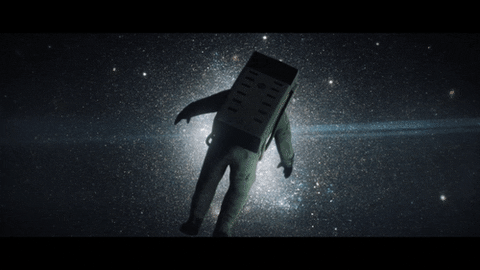
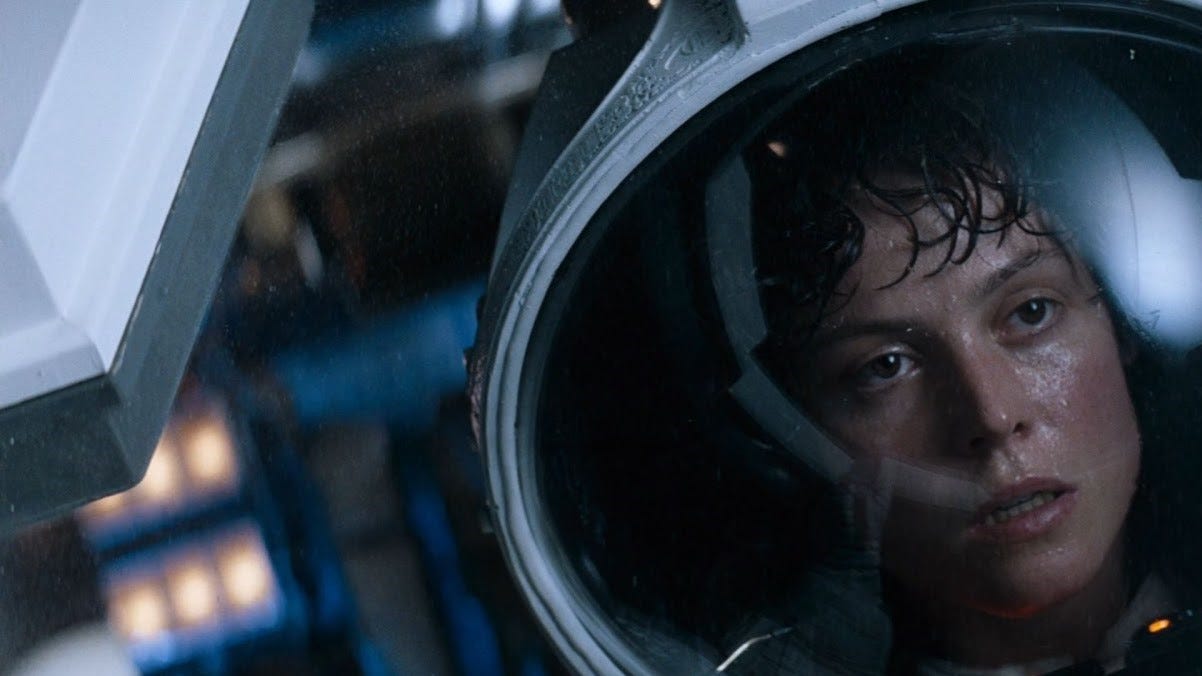

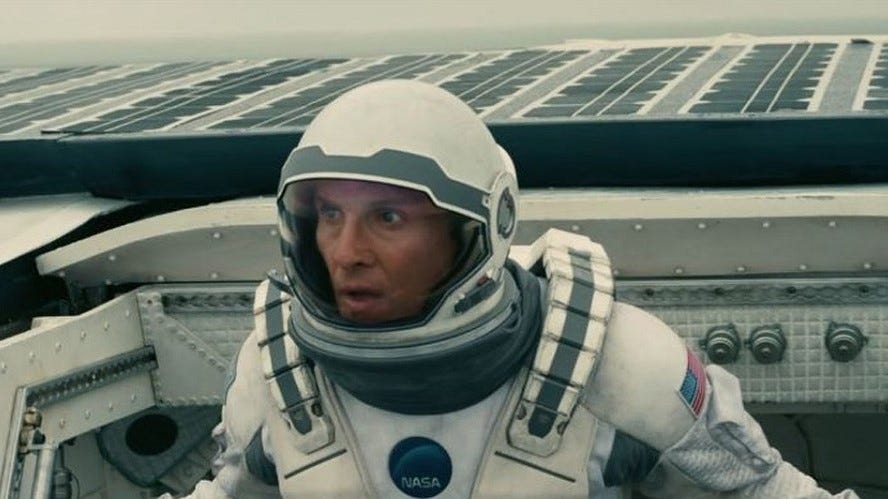
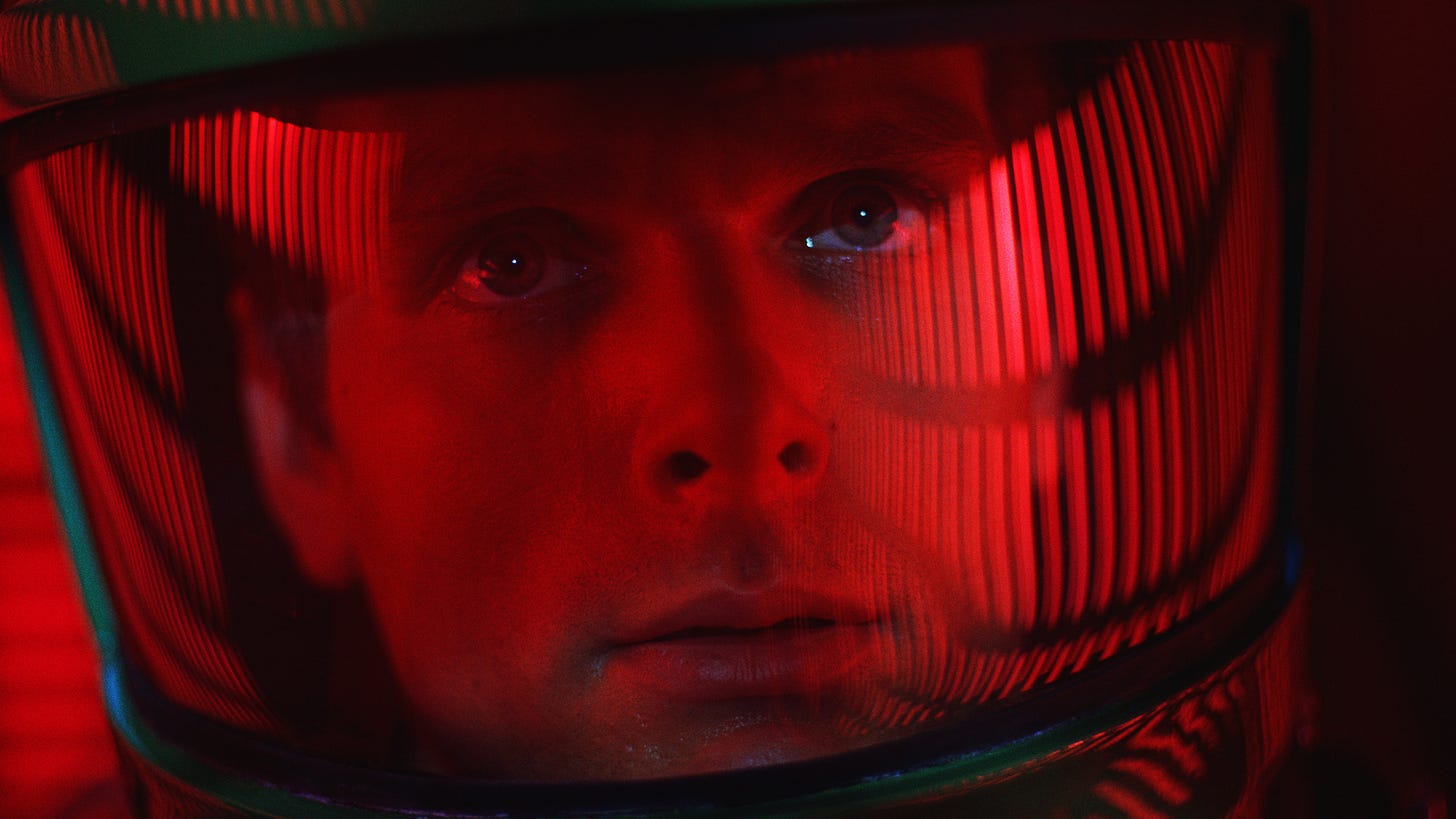
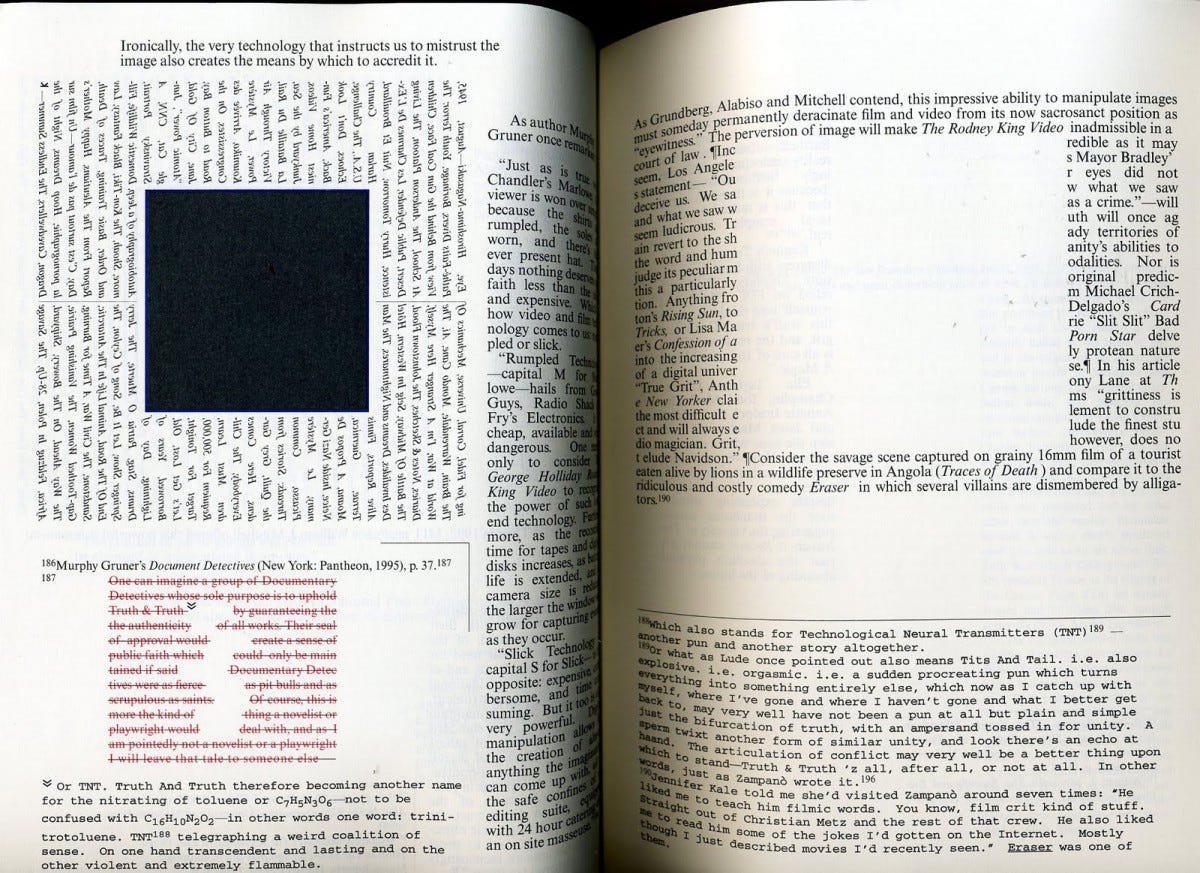
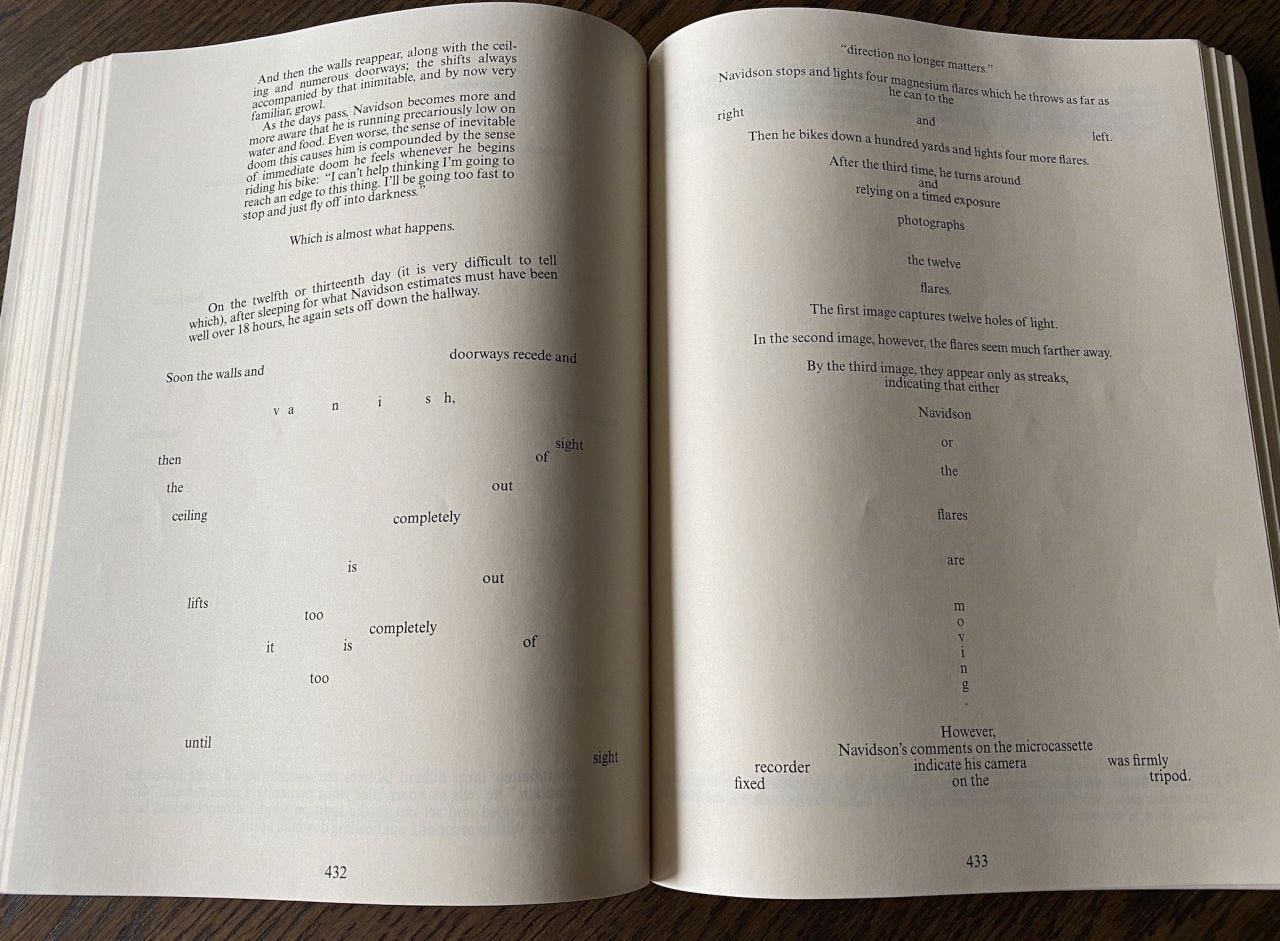
I REALLY wanna check out that House of Leaves, Andrew! Sounds right up my alley.
I was just talking about Interstellar the other day. That scene on the water planet is probably the most anxiety-inducing thing that's ever been put to film.